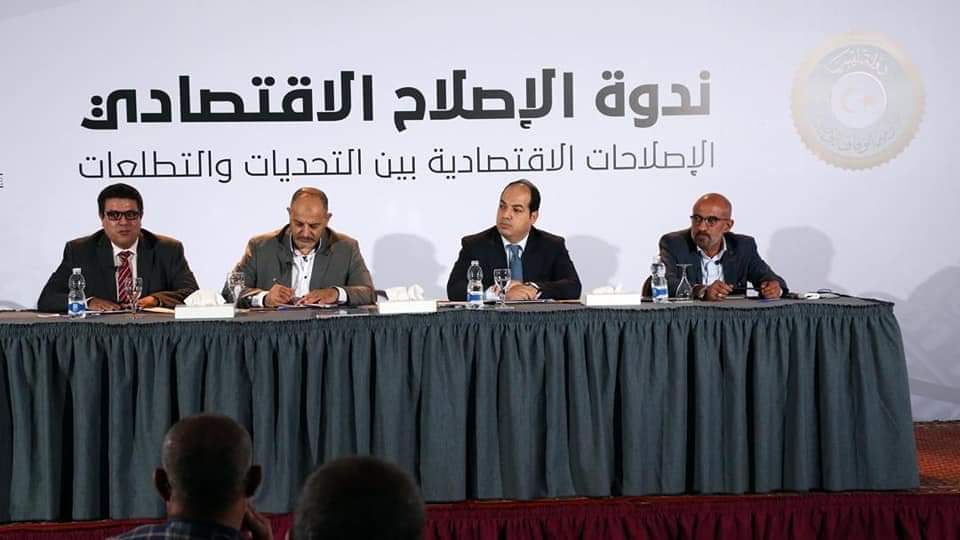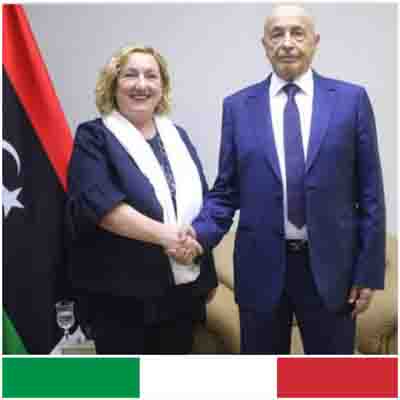By Sami Zaptia.

London, 11 October 2018:
The Tripoli-based Central Bank of Libya is not delaying Libya’s economic reforms, according to Presidency Council (PC) deputy head Ahmed Maetig.
The bank had come in for some criticism and had been blamed by some for the lack of speed in the implementation of economic reforms. Critics of the Tripoli-based central bank have accused it of being against the reforms.
Maetig said that the CBL had been cooperating fully in implementing the recent economic reforms. He cited the official circulars sent by the CBL to Libya’s commercial banks as evidence of this.
However, Maetig laid the blame for any delay in implementing the initial part of Libya’s economic reform plan – in the form of a tax on official foreign exchange sales for private use – on Libya’s commercial banks
Maetig was speaking at the Economic Reform Forum held at Tripoli’s Corinthia hotel on Tuesday. The forum follows on from a meeting Tuesday between Maetig and PC head Faiez Serraj during which they reviewed the progress of the economic reforms.
Addressing the forum, Maetig reviewed the stages of preparation for the economic reform programme that had began last year, and the meetings held in Libya and abroad, ranging from the London to the Rome and Tunisia meetings, and others, on a mission that he admitted was not easy for the Presidential Council in its efforts to achieve the success of the economic reform programme.
He revealed that Libya’s economic reform programme consisted of 35 points and that these needed more than a year and a half to be implemented on the ground.
Maetig explained that the first four points of the economic reforms were adjusting the exchange rate, reforming fuel subsidies, restarting development projects, the private sector entry into housing projects, and support for commercial banks that will act as guarantors of loans to the private sector.
He expressed satisfaction with the results of the economic reforms citing the opening of credits to one out of five local commercial banks, worth 500 million dinars within a week, and supplying more than 500 million dinars in cash, stressing that this value is for just one bank.
The deputy head of the PC pointed out the need to put ìn place a mechanism for commercial banks to implement their work (related to the economic reform) to the fullest.
In this context, he revealed that a committee will be set up comprising the PC, the CBL and the Attorney General’s office to follow up on the implementation of reforms as required, and to implement CBL directives and to to ensure their speedy implementation.
The implication being that some banks and/or some of their their staff/management were obstructing the foreign exchange part of the economic reform programme.
It will be recalled that there are accusations that Libya’s banks were complicit in foreign exchange black-market activities.
Maetig added that one of Libya’s biggest local banks, for example, had only implemented a minimal part of the CBL’s new reform related directives. Maetig suggested that the bank’s board of directors should be changed.
With regards to the newly introduced tax/levy on official foreign exchange sales for private use, Maetig pointed out that the imposed tax rate was not fixed and that his government hoped to reduce it gradually as the official and black-market exchange rates got closer over time.
He also said that the reform plan included control of the previously rampant government expenditure and compliance with specific financial arrangements.
He said that there will be measures taken to combat the foreign exchange black-market, through particular actions and measures. He gave no further details.
The reform programme also included addressing the government’s public debt, and reducing it according to agreed stages and plans.
There will also be support by the government to housing development projects and work to complete them as soon as possible.
The government will also combat and stop illegal abuse and actions that are detrimental to the state’s finances.
The performance of local banks and their responsiveness to specially developed programmes will also be monitored
Maetig stressed the importance of supporting the National Oil Corporation (NOC) to increase production rates. He highlighted the link between the NOC’s ability to produce oil unhindered by political or industrial stoppages and the exchange rate of the Libyan dinar.
He stressed the degree to which Libya and its economy are dependent on oil revenues and how the Libyan dinar exchange rate is the main factor in influencing Libyan citizen’s standard of living.
Ultimately, Maetig was bullish that Libya’s economy will improve by the end of the year, promising real change “within months not years”.
It will be recalled that since the annoncement of the economic reforms on 12 September, the Libyan dinar has gained value by about one dinar against the U S. dollar – from LD 5.50 /dollar – down from the 6.30 – 6.60 band – in the black-market. This has been reflected in some price reductions.
https://www.libyaherald.com/2018/09/13/long-promised-economic-reforms-agreed/
https://www.libyaherald.com/2018/09/13/libyas-economic-reforms-a-tax-levy-on-foreign-currency-sales-increased-currency-allowances/







